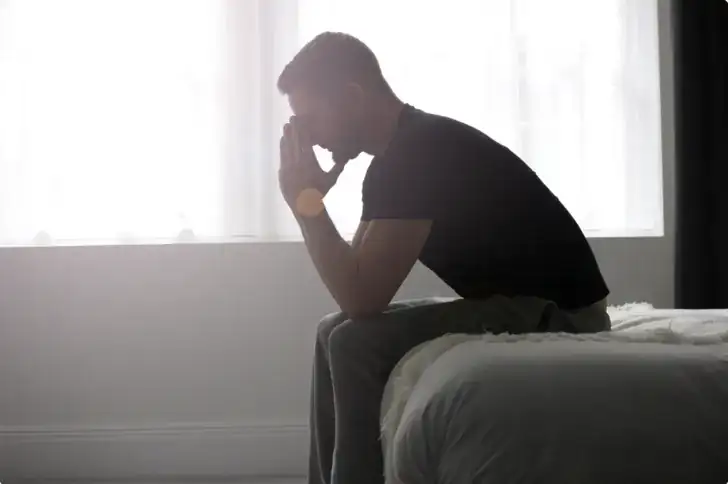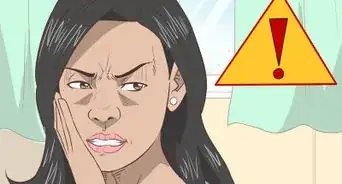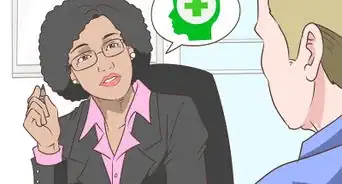Do I Have Depression?
Maybe it’s a hopeless feeling that you just can’t shake, or a sense of emptiness as you drift through your usual routine. Could depression be the cause of your struggles?
Only a doctor or mental health professional can diagnose you with depression, but this quiz can help you get a better grasp on your symptoms (and how much they’re impacting your daily life). In the following questions, choose the statement you most identify with based on the past 2 weeks so you can get a better idea of where you stand—and most importantly, what you can do to start feeling better.
If you’re feeling suicidal (meaning you’re having thoughts of self-harm or ending your life), call or text 988 for support and assistance (in the United States). If you live internationally, click here for a list of global hotlines.

Questions Overview
- Strongly disagree.
- Slightly disagree.
- Slightly agree.
- Strongly agree.
- Strongly disagree.
- Slightly disagree.
- Slightly agree.
- Strongly agree.
- Strongly disagree.
- Slightly disagree.
- Slightly agree.
- Strongly agree.
- Strongly disagree.
- Slightly disagree.
- Slightly agree.
- Strongly agree.
- Strongly disagree.
- Slightly disagree.
- Slightly agree.
- Strongly agree.
- Strongly disagree.
- Slightly disagree.
- Slightly agree.
- Strongly agree.
- Strongly disagree.
- Slightly disagree.
- Slightly agree.
- Strongly agree.
- Strongly disagree.
- Slightly disagree.
- Slightly agree.
- Strongly agree.
- Strongly disagree.
- Slightly disagree.
- Slightly agree.
- Strongly agree.
- Strongly disagree.
- Slightly disagree.
- Slightly agree.
- Strongly agree.
- Strongly disagree.
- Slightly disagree.
- Slightly agree.
- Strongly agree.
- Strongly disagree.
- Slightly disagree.
- Slightly agree.
- Strongly agree.
More Quizzes
Depression: A Closer Look
If you suspect that you might be struggling with depression, you’re not alone—according to the World Health Organization, about 280 million people all over the globe have this mental illness.[1] While only a mental health provider can officially diagnose you with depression, you can still stay informed on what depression is (and isn’t!), and how you can ask for help.
Depression vs. Sadness vs. Anxiety Disorders
- Sadness is a negative emotion whose symptoms do not severely impact daily activities for more than two weeks. Everyone feels sadness and grief from time to time, like after the end of a relationship or after the loss of a loved one. While the healing process isn’t easy, sad and grieving individuals have a pretty firm sense of self-esteem, and don’t experience their negative feelings indefinitely. They’re also able to experience happy and positive moments amidst the sad ones. While a grieving individual can also have depression, the two experiences aren’t one and the same.
- Anxiety disorders revolve around frequent worry and fear. People with anxiety disorders experience anxiety on a long-term basis (more than 2 weeks) to a point where it affects their day-to-day routine. While anxiety disorders and depression can exist at the same time, anxiety disorders are a separate diagnosis from depression.
- Depression is a long-term mental illness. Depression fundamentally changes the way a person views themselves and the world around them—a depressed individual often feels hopeless, worthless, and empty. Symptoms of depression last for a long time (more than 2 weeks), and can bleed into a person’s eating habits, energy levels, and sleeping schedule.
Symptoms of Depression
- Feeling hopeless: No matter how you spin things, you can’t seem to find a light at the end of the tunnel. You feel like you’re stuck in your negative thoughts and feelings, and that there’s no escaping them.
- Self-hatred: You carry around a constant sense of guilt, and frequently feel worthless. You often view your shortcomings and mistakes under a microscope, and are extremely hard on yourself.
- Less interest in what you usually enjoy: Your old hobbies and pastimes don’t have the same appeal that they once did, and you don’t feel particularly motivated to do any of the activities you once enjoyed.
- Low energy levels: You constantly feel fatigued and sluggish, and struggle to finish simple tasks without feeling drained.
- Sense of recklessness: You find a sense of escape in dangerous pastimes, like gambling, drugs, or other activities that put your life at risk.
- Appetite changes: Your weight changes pretty drastically (by at least 5%) within the span of a month.
- Poor sleep schedule: You often find yourself sleeping too much or not enough.
- Irritation: You have a shorter fuse than normal and find yourself getting irritated with people frequently.
- Issues with focus and concentration: You struggle to focus on the tasks ahead of you, and aren’t the best at recalling things. You also find it difficult to make decisions.
- Random aches: You feel random pains in places like your stomach, back, and/or head, but you can’t figure out what’s causing them.
- Suicidal thoughts: You sometimes think about harming yourself or ending your own life.
Ways to Get Help
- Visit a mental health professional and/or your doctor. Share what you’re feeling and experiencing with a psychiatrist or with your regular doctor. They can take a closer look at your symptoms and let you know if depression could be the issue.
- Take medication prescribed by your doctor. Your psychiatrist or doctor might suggest taking an antidepressant, which gives you some extra support on a day-to-day basis. Some types of medications your doctor might recommend include Selective Serotonin Reuptake Inhibitors (SSRIs), Serotonin-norepinephrine Reuptake Inhibitors (SNRIs), Monoamine Oxidase Inhibitors (MAOIs), and more.
- Visit a therapist. Therapists take a deeper dive into your mental health struggles in a safe and supportive environment. There are lots of therapy varieties out there, including Cognitive Behavioral Therapy (CBT), Dialectical Behavior Therapy (DBT), and Interpersonal Therapy—a mental health professional can help you figure out the best type of treatment and therapy that meets your needs.
- Call a helpline if you’re feeling suicidal. Dealing with suicidal thoughts and feelings can be an extremely isolating experience, but you aren’t alone. Call or text 988 right away (if you live in the United States) to get connected with a trained counselor. If you live internationally, click here for a directory of global helplines that can connect you with the support you need.
Want to learn more?
Want to learn a little more about the signs, symptoms, and treatment options for depression? Here are a few expert-verified sources to help you get started:
- https://www.helpguide.org/articles/depression/depression-symptoms-and-warning-signs.htm
- https://www.apa.org/topics/depression
- https://www.nimh.nih.gov/health/publications/depression
- https://www.cdc.gov/tobacco/campaign/tips/diseases/depression-anxiety.html
- https://my.clevelandclinic.org/health/diseases/9290-depression
You Might Also Like
Medical Disclaimer
Any medically related content, whether User Content or otherwise found on the Service, is not intended to be medical advice or instructions for medical diagnosis or treatment, and no physician-patient or psychotherapist-patient relationship is, or is intended to be, created.
















